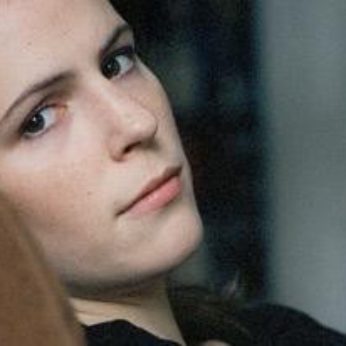Composer: György Kurtág (b. 1926)
Performance date: 04/07/2016
Venue: St. Brendan’s Church
Composition Year: 1985-7
Duration: 01:15:00
Recording Engineer: Richard McCullough, RTÉ lyric fm
Instrumentation Category:Duo
Instrumentation Other: S-solo, vn
Artists:
Nurit Stark -
[violin]
Caroline Melzer -
[soprano]

Berceuse – Wrap your overcoat, O lofty dream, around the child.
Part 1/5
This is a hugely challenging work for the
performers, the violin part is borderline unplayable. His previous song cycle
for soprano and violin, Scenes from a
Novel, had included a bass and cimbalom, this time voice and violin step
forward onto empty air. And yet almost every other violinist one meets wants to
tackle this ground-breaking piece and the sopranos are not far behind. This is
a tribute to the vitality of Fragments for
like the great nineteenth century song cycle, Winterreise, it is a work before its time that did not immediately
find its audience. Here from the late twentieth century is the successor to
Schubert’s Winterreise, but this time
the journey is all within.
Ziel, Weg, Zögern – There is a destination, but no path to it;
what we call a path is hesitation. Part
3/7
Unlike Winterreise
Kafka and Kurtág’s journey has few physical markers. There are many references
to a metaphysical path but no conventional journey is undertaken. Physical
examples of a journey such as the path covered in leaves or the station where
the train does not stop are few, but there are enough signs along the way to
indicate the idea of a traveller. At times the succession of unrelated fragments give the impression that
we have wandered into Hesse’s Glass Bead
Game where the Magister Ludi himself is showing us how seemingly unrelated
ideas can have a deep but far from obvious connection. For fear that we take
the idea of a true path too seriously, the two Ks go out their way to show it
cannot exist. The nearest they get to a direction is to show that from a certain point on, there is no going
back. That is the point to reach.
Nimmermehr – Nevermore, nevermore, will you return to the
cities, nevermore will the great bell resound above you Part 1/6
Kafka and Kurtág each lived through one of
the World Wars and were each faced with the fragmented physical and cultural
debris of the aftermath. The two Ks both belonged to the same central European
tradition, which was almost completely decimated during the Second World War
and the Soviet takeover. The idea of saving fragments from the devastation must
have been second nature to both of them as was the reality of exile. One
commentator quotes a line of Eliot’s Waste
Land, another work written in the shadow of war – these fragments I have shored against my ruin. This suddenly makes
sense of the quest to gather up fragments from another time and from them to
make a larger fragment to shore against our ruin.
Eine lange Geschichte – I look a girl in the eye, and it was a
very long love story with thunder and kisses and lightning. I live fast Part4/2
Throughout the forty fragments we find
these wonderful miniature stories, a love affair in a glance and a minute of
music. There are stories about a girl’s smile, leopards in a temple, hounds in
a courtyard, musicians in a tram, Snakes in the desert and even messages for
Schumann and Boulez. Each tale takes its place in the saga, each seemingly
inconsequential fragment becomes a gesture in a story that tries to hold a
broken world together.
Copyright © 2025 West Cork Music. All rights reserved.
Designed and developed by Matrix Internet